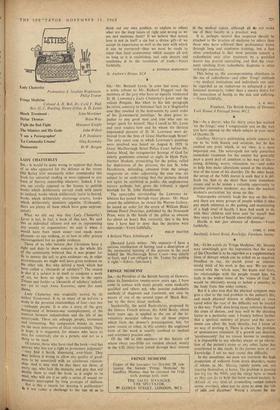Lady Chatlerley Prebendary A. Stephan Hopkinson, Philip Trotter Fringe Medicine
Colonel A. H. Bell, Dr. Cyril V. Pink Rev. G. C. Harding, Henry Gillet, A. D. Lewis Shock Treatment . John Mortimer Dylan Thomas Brian Way Fight the Bad Fight Margaret Knight The Minister and His Gods John Willett q am a Pornographer' J. P. Donleavy Commedia Umana' Oleg Kerensky Democratic D. W. Brogan LADY CHATTERLEY SIR,—It would be quite wrong to suppose that those of us who appeared for the defence at the recent Old Bailey trial necessarily either commended this book for universal reading or were opposed to any form of literary censorship whatever. Indeed, I for one am totally opposed to the licence to publish books which deliberately corrupt truth with intent to mislead, books which deliberately incite to hatred, books which deliberately encourage cruelty, books which deliberately stimulate appetite. (Unhappily, there are plenty of these which have gone unprose- cuted.) What we did say was that Lady Chatterley's Lover is not, in fact, a book of this sort. We said this as individual citizens and not as representing any society or organisation; we said it when it would have been much easier—and much more pleasant—to say nothing, or at best to offer private encouragement but no public evidence.
Those of us who believe that Christians have a right and duty to show concern in the whole life of the community believed that it was proper for us to answer the call to give evidence—as, in other circumstances, we might well have given evidence on the other side. But why defend a book which has been called a ,'chronicle of adultery'? The reason is that if a subject is in itself to condemn a work of art, we have no right to listen to the opera Tristan and Isolde—a 'chronicle of adultery' indeed; for yet to read Anna Karenina, upon the same theme.
Lady Chatterley was originally named by its author Tenderness. It is, as many of us believe, a study in the personal relationships of four—not two —unhappy people. It is also a story of the grey background of between-war unemployment, of the contrast between industrialism and the life of the countryside. These are unhappy people, tormented and tormenting. But compassion breaks in, even on the most destructive of illicit relationships. There is hope, it is suggested, for sinners who learn to care for somebody else as a person, and not as a thing to be used.
Of course, those who have read the book—and has anyone who has not a right to pronounce judgment? —may find it harsh, distressing, over-blunt. They may believe it wrong to allow any quality of good- ness to be associated with an adulterous relation- ship. And it may well be that there are those, of every age, who lack the maturity and pity that will enable them to read the book as it ought to be read, who will see it as only a series of sexual en- counters interrupted by long passages of dullness. But is this a reason for denying it publication? Is it not rather a challenge to the rest of us to
think out our own position, to explain to others what are the deep issues of right and wrong as we see and maintain them? If we believe that sexual love is not in itself a sin but a divine gift—if we accept its importance as well as the ease with which it can be corrupted—then we must be ready to resist that fatal compromise which accepts all evil so long as it is established, and only detects and condemns it in the revelation of truth.—Yours faithfully, St. Andrew's House. EC4 A. STEPHAN HOPKINSON














































 Previous page
Previous page